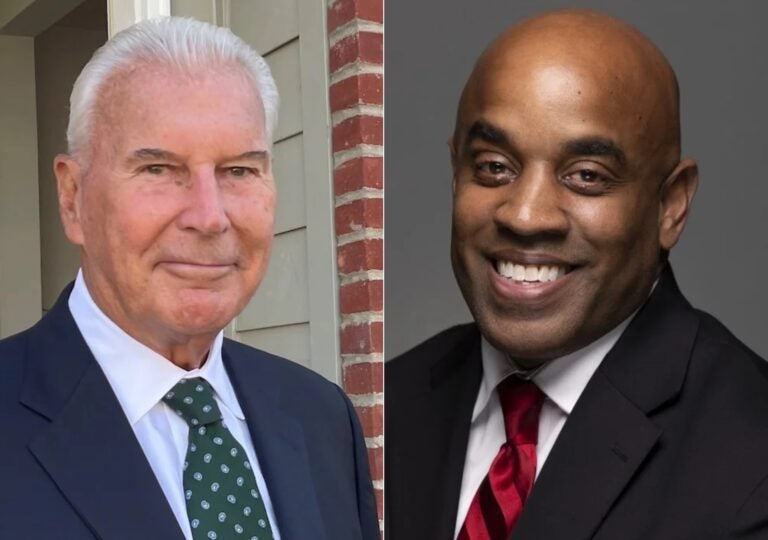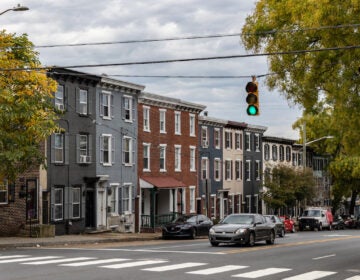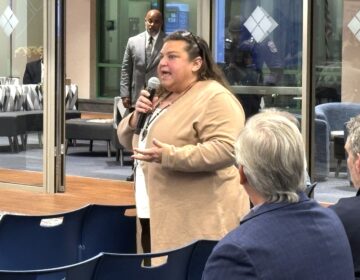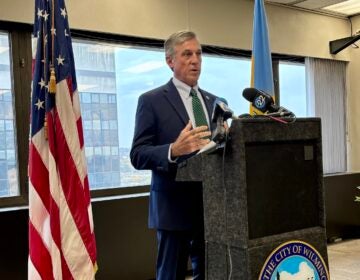Wilmington mayor says ‘mob rule’ defeated his quest to rescind residency law. Council president calls remarks ‘disrespectful’
Mayor Purzycki chose not to veto the measure and set up another fight in council chambers, but says the process was an ‘embarrassment to this government.’
Listen 1:35
Mayor Mike Purzycki (left) says the meetings that upheld residency were "mob-controlled'' but Council President Trippi Congo says that's disrespectful to the residents who voiced their opinions. (City of Wilmington)
From Philly and the Pa. suburbs to South Jersey and Delaware, what would you like WHYY News to cover? Let us know!
When Wilmington City Council upheld the residency law for city government employees last week, council president Trippi Congo said it was “100% due to the public’’ that descended en masse on council chambers to support the rule and denounce Mayor Mike Purzycki’s nearly two-year quest to end it.
Now Purzycki has a new name for the citizen advocates that persuaded some council members to change their votes with the threat of targeting them in the 2024 elections.
The mayor calls it “mob rule.”
In a 1,500-plus word written statement that at times sounded like a diatribe — an uncharacteristic posture for the 78-year-old attorney who normally presents a dignified bearing — the mayor said he would not issue a veto but would let the measure become law without his signature.
A similar law requiring municipal workers to live in Wilmington for five years has been on the books since the late 1990s. But in October the mayor triggered outrage and puzzlement among Congo and other council members when he declared that the city was no longer enforcing the law because it was no longer in effect, even though the city’s lawmaking body had not exercised their power to rescind it.
The new law does have one significant change. The old law gave new hires six months to move into Wilmington, but now they have one year to do so.
In addition, the law creates a residency assistance fund to help new employees with security deposits, down payments, signing bonuses, and relocation fees. The amount of the fund will be decided during the city’s annual budget process next year.
Purzycki would not agree to an interview, in keeping with his public stance on the issue since he upped the ante in October. But in his statement, he excoriated council members and the dozens of residents, some of them boisterous, who packed City Council chambers on three occasions to support the residency rule and oppose his proposal to expand residency to include all of New Castle County.
Calling those competing proposals “the battle lines,’’ Purzycki said his council foes on the issue “summoned members of the community’’ to chambers.
“They appealed to a lingering fear that county residents would displace city residents for city jobs,’’ the mayor’s statement said. “Sadly, some speakers injected the issue of race into this discussion, arguing that Black employees would be disadvantaged. Nowhere during the mob-controlled meetings was there recognition of the increased marketing and outreach efforts by the city’s Human Resources Department to recruit city residents for local government jobs. Also conveniently omitted during hours of discussion was the fact that Wilmington’s hiring process has, and always will, give preference to applicants who live in the city.”
Administration officials could have addressed council members and made such points during the meetings to counter some of the arguments, but did not do so. The mayor had argued in his October news release that the city has been unable to hire cops and fill other key positions, such as city lawyers and traffic engineers, because of the residency rule.
And now that the bill has been enshrined once again in city law, the mayor says the discussions on the floor were unfair to his side.
“Opponents argued, with crowd-pleasing indignation, that there was no need to leave the city to fill vacant positions because Wilmington already had the talent,’’ Purzycki said. “And while I agree that Wilmington residents have plenty of talent, we are still left with crucial, unfilled positions, some requiring a specialized set of skills and years of experience.
“The legislative process that unfolded was an embarrassment to this government. There was never a sober debate about the merits of retaining residency. It was just grandstanding, catcalling, badgering, and political bullying. … The intimidating and uncontrolled mob that was encouraged to show up at the committee meeting and Council meetings literally scared members of Council into changing their votes.”
In the end, eight of 13 council members voted to uphold the residency rule. One voted no, three abstained, and one was absent.
Congo says it’s a “blatant lie’’ for mayor to say lifting law was his idea
Congo, reached Tuesday morning by phone, said he was stunned by Purzycki’s remarks in the wake of his public defeat.
“It was very disappointing that he just didn’t hear the people who came to those meetings and pleaded for us to keep residency,’’ Congo said. “We had probably over 200 public comments. We had over ten hours of public comment and 99.99% of them were to keep residency intact.”
“And then for him to call the people who showed up ‘a mob,’ that was so disrespectful,’’ said Congo, who had calmly kept the meetings on track. “There were some people who were outspoken but they were in the minority and for him to paint that picture like the meetings were mob-controlled was so unfair, and they didn’t deserve that.”
Congo also contradicted the mayor’s position that he only “chose to wade into this inevitable controversy” after Congo “expressed his desire to eliminate the residency requirement altogether.”
Congo previously sponsored a bill to eliminate the rule last year, but once he realized how much support it had, he decided not to push the legislation. The administration later convinced Councilman Al Mills to become the sponsor, but facing fierce opposition at an October meeting, Mills decided to hold the measure.
“The administration’s position was straightforward and not at all political,’’ the mayor said. “Our goal in hiring is always to secure the best talent to enhance operational excellence, and insisting on residency has made it increasingly difficult to fill positions with local candidates, especially those in specialized roles and in public safety. Moreover, we have to compete with other governments that have no such residency requirements.’’
Congo, however, on Tuesday that the statement that eliminating residency was his idea was a “blatant lie’’ by Purzycki.
“They came to me and said, ‘Hey, man, we’re having a staffing shortage, constituents aren’t getting their city services and we think we need to relax residency. That wasn’t my idea. They came to me with it.”
Congo said the mayor is now resorting to the same fear-mongering he claims to despise, especially when Purzycki noted that one former state lawmaker had posted on social media that removing residency “will put us back 100 years.”
“Really?” the mayor’s statement said. “What will really put the city back 100 years is not being able to pick up the trash on time, or not properly testing the quality of our drinking water, or not getting a police officer when we need one.”
“It’s like a fear tactic saying that the trash is going to be delayed when they’re short two sanitation workers,’’ Congo quipped. “You mean to tell me they can’t find two sanitation workers. That makes no sense.”

Get daily updates from WHYY News!
WHYY is your source for fact-based, in-depth journalism and information. As a nonprofit organization, we rely on financial support from readers like you. Please give today.






